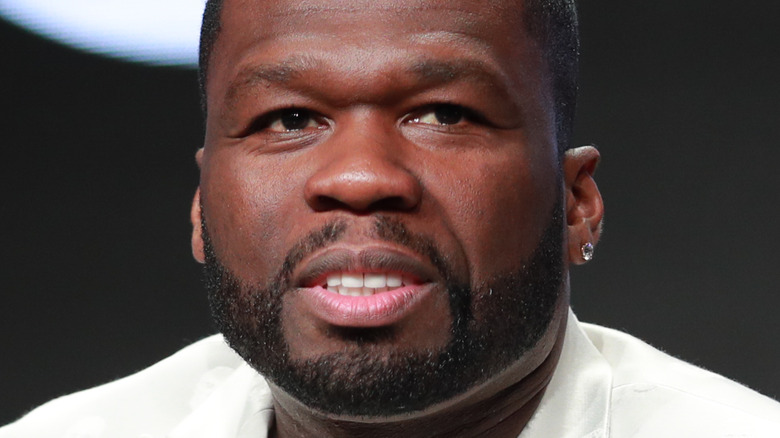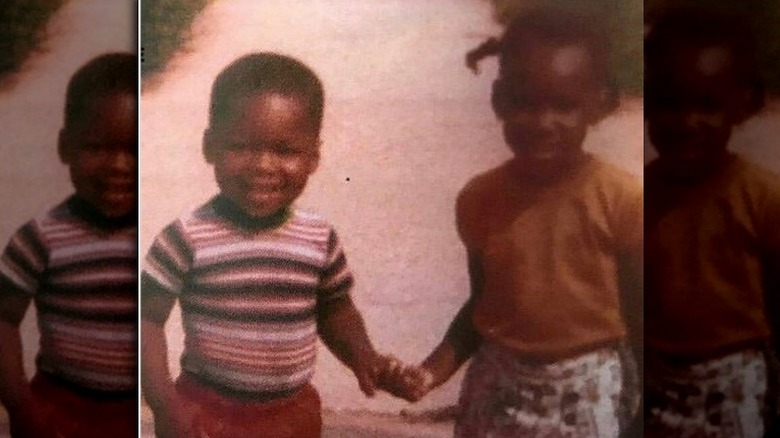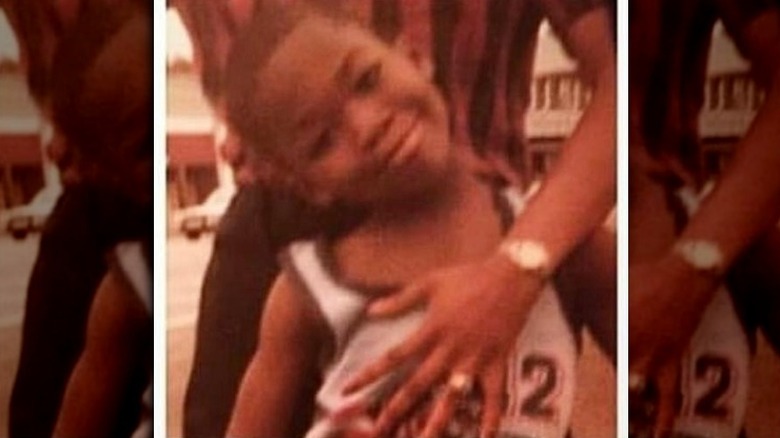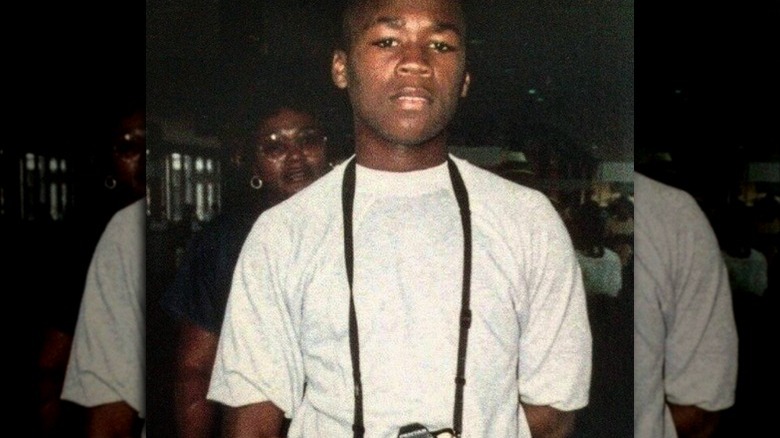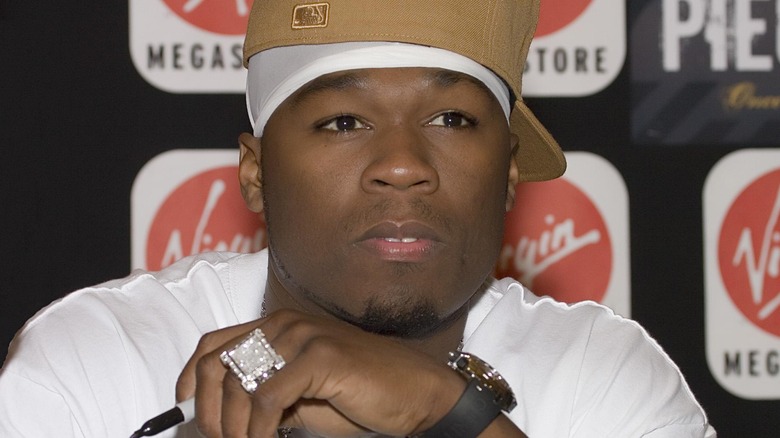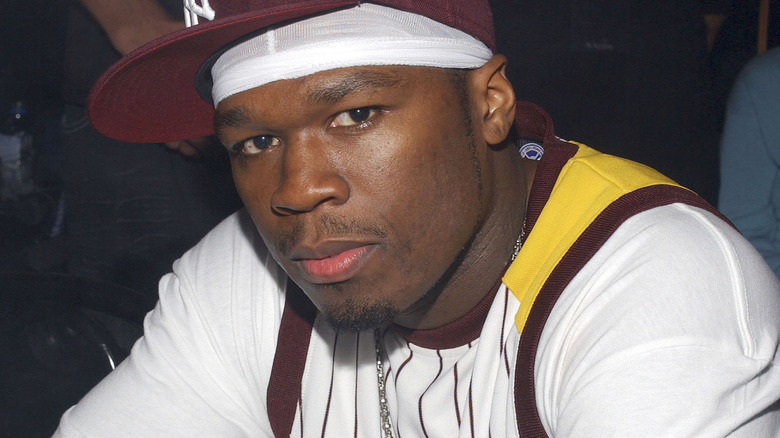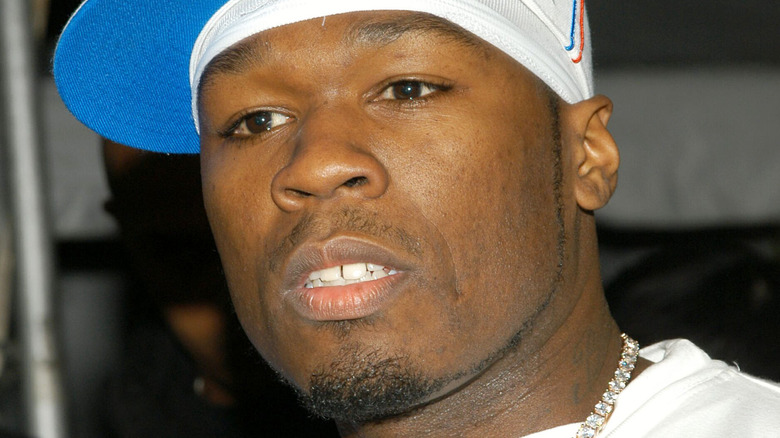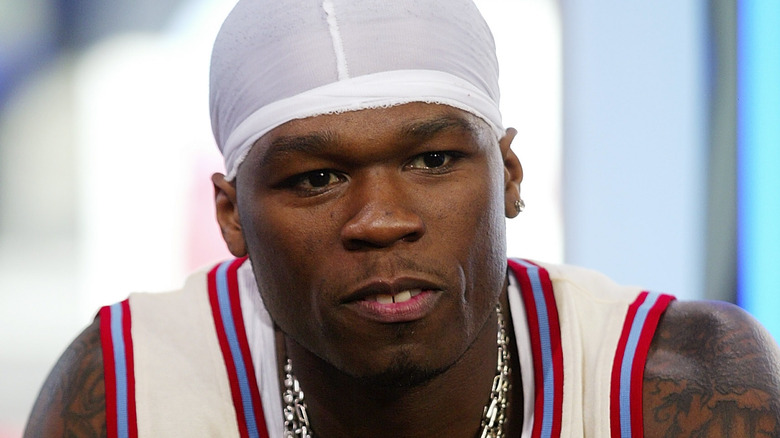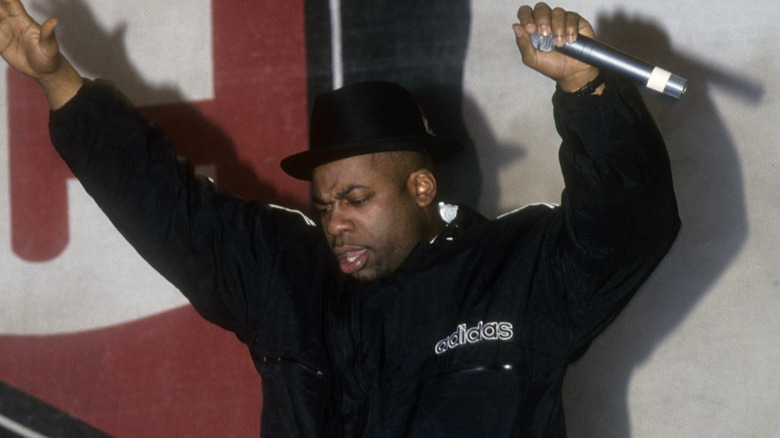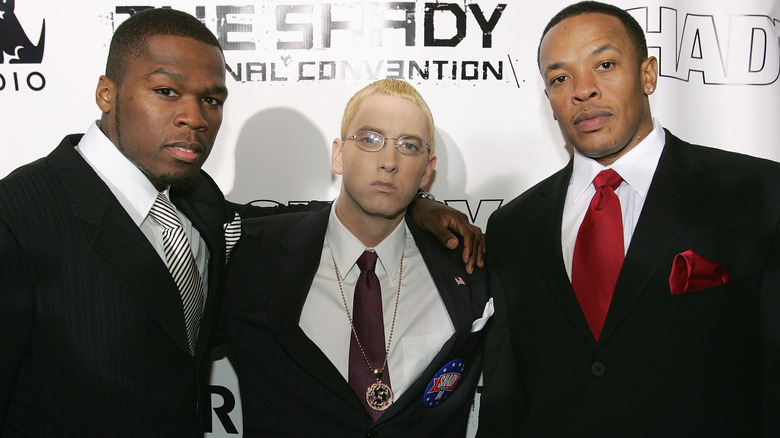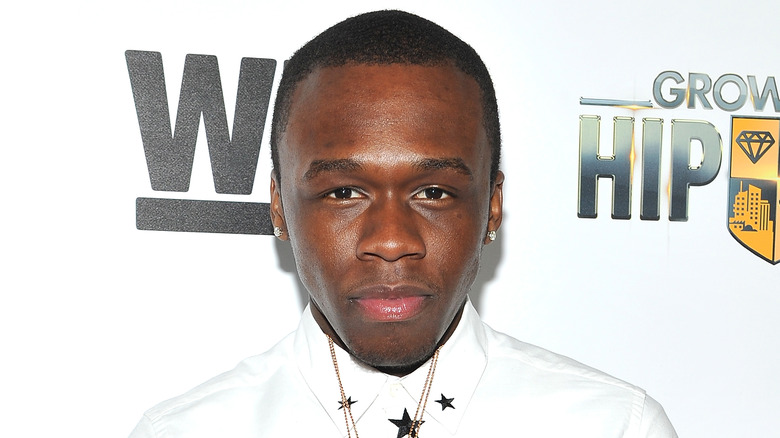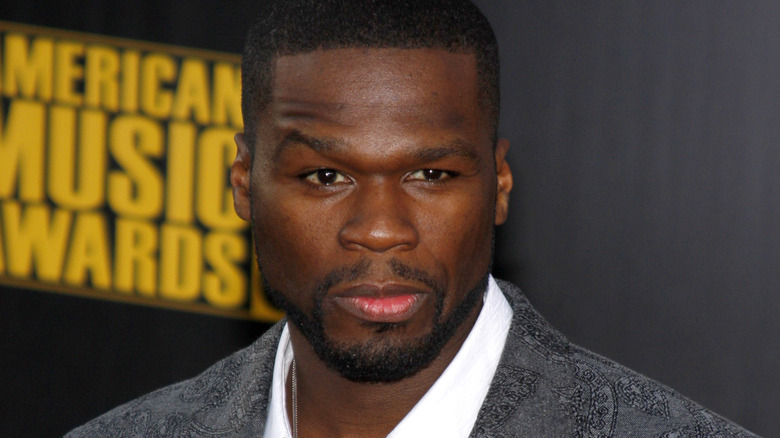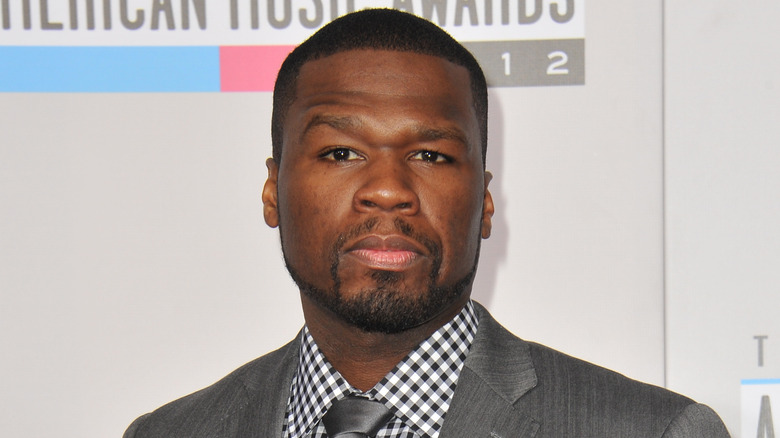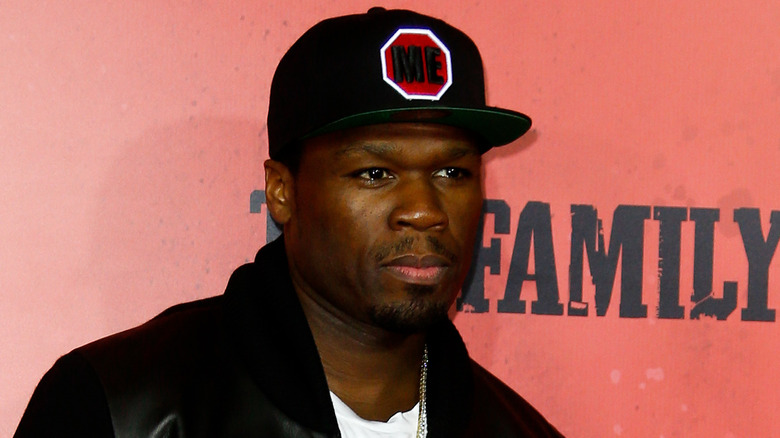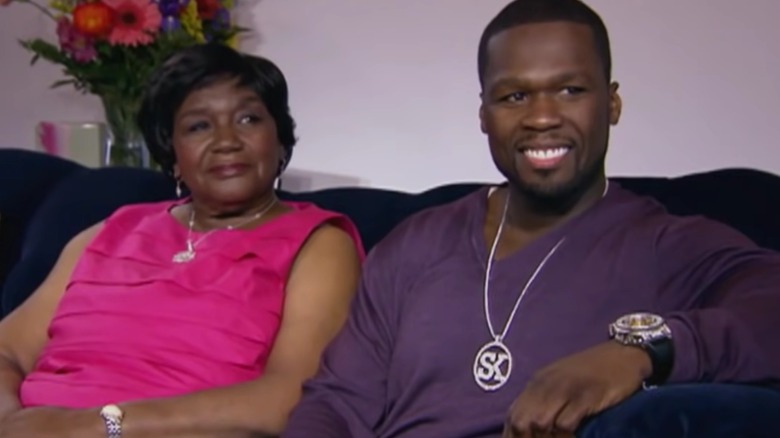The Tragic Real-Life Story Of 50 Cent
The following article contains references to drug dealing, murder, domestic abuse allegations, and mental health issues.
His tracks may not blast through every mall like they used to, but 50 Cent remains one of the biggest names in hip-hop. Since landing (upside down) on our screens in the iconic "In Da Club" music video in 2003, Fiddy has amassed legions of fans and more than a few 50 cents to his name. In addition to his musical endeavors, he has branched out into clothing and merch, film, and even boxing promotion. But the path towards success was anything but smooth for the kid from Queens.
From a young age, 50 Cent learned to survive and thrive in the most challenging conditions, an approach that he carried into his adult life. As a youngster, he was bullied and blindsided; as a teen, he was sent to juvie; and when he reached adulthood, he was almost killed. Few have lived to tell the tale after being dropped into such stark adversity, something that 50 himself is acutely aware of. As such, these many past traumas have created an aura of mystique around the rapper, who's become something of a hip-hop folk legend. As he mused to Rolling Stone in 2003, "People love the bad guy. ... It's cinematic law: The bad guy has to die. But sometimes the bad guy gets a record deal and becomes a superstar like 50."
Despite his continuing misfortunes, Fiddy resolved to get rich or die tryin', going from traumatized teen to international superstar. This is the tragic real-life story of 50 Cent.
50 Cent's teen mother was a drug dealer
Curtis Jackson, aka 50 Cent, didn't have an easy start in life. Born on July 6, 1975 to his 15-year-old single mother, Sabrina Jackson, he was raised in a drug-afflicted neighborhood of Queens, New York. Accordingly, Fiddy's childhood would be fraught with hardship. To make ends meet, Sabrina dealt drugs, a profession she had pursued long before her son's birth, per the book "50 Cent: No Holds Barred." As the rapper told Spin, "She didn't see welfare or Burger King as a real option. She did what she thought she had to do to take care of me."
Although he has acknowledged that his mother's career path was ultimately a means of supporting him, 50 has also said that drug dealing brought out the worst in Sabrina. Fiddy admittedly feared his mom, so much so that he would rather face school bullies than his own mother. "I got bumped around a lot in the park but I was more afraid of my mom than the people I got bumped around [by] because I could not escape her," he told Page Six.
Sabrina was apparently a hard-boiled woman who would not tolerate her young son exhibiting emotional vulnerability. As 50 explained to Page Six, his mom would often scold him and question his masculinity if he dared to cry. "She would look at me on the floor [when he was upset] and say, 'Get up — what you over there crying for acting like a little girl [for],'" he divulged.
If you or anyone you know is struggling with addiction issues, help is available. Visit the Substance Abuse and Mental Health Services Administration website or contact SAMHSA's National Helpline at 1-800-662-HELP (4357).
His mother died horrifically
At the age of 8, 50 Cent's childhood would be irreparably changed when he lost the most important person in his life. In 1983, Sabrina Jackson died in a fire, per Page Six. She was just 23. "I think shock is the best way to describe how I felt when my mother died," he told The Big Issue. "I didn't understand it. To have a single parent as your guardian — they're your whole life." At first, 50 was in denial. He explained to Oprah Winfrey that he struggled to comprehend what his grandmother meant by "she's not coming back." As such, 50 would tell himself that his mother was still with him whenever someone would remind him that she was gone forever. "It didn't register," he said.
There remains much speculation as to how exactly Sabrina died, but it is generally believed that there was foul play involved, with a number of outlets reporting that she was murdered. According to The Guardian, she met a stranger who spiked her drink, took her home unconscious, and left the gas on, killing her. 50 told the publication that his mom's "body was all f***ed up" when she was found later that week.
Despite his mother's harsh tendencies, Fiddy remembers her fondly, acknowledging in an interview with MSNBC that she had to adopt a tough veneer "to play in a man's world." Tragically, he also conceded that, of his grandmother's nine children, "My mother is the only one dead.”
50 Cent's grandmother took him in when no one else would
Following his mother's tragic demise, 50 Cent found himself a lost waif. But there was one person whom he could always count on: his grandmother, Beulah Jackson. In the VH1 documentary "50 Cent: The Origin of Me" (via Digital Spy), the rapper revealed that his grandmother legally adopted him when he was a boy. Accordingly, Beulah raised 50 as if he were her own son, and his gratitude would remain unwavering. In 2005, he would say thank you for everything Beulah did for him by buying his grandparents a house, per Vanity Fair.
But things weren't easy growing up in his grandparents' home. In addition to his unresolved grief, 50 ultimately felt unwelcome by certain family members in the bustling household. This was largely due to the supposed resentment of his Aunt Sylvie, who had always been "the baby" and thus the apple of her mother's eye, a role seemingly usurped by 50 once he moved in. As he heartbreakingly recounted to The Big Issue, Sylvie noted that her mom reserved a special look just for Fiddy, which would often be accompanied by a hug. "And I said to Sylvie, do you notice she always pauses and looks at me before she speaks to me? And Sylvie said, yeah. ... And I said, I think she sees my mother's face on top of mine," he related.
The rapper later claimed on Twitter that Sylvie's alleged resentment culminated in her poisoning his dog with cockroach killer.
The rapper has a lot of childhood trauma
Born into poverty, neglect, and narcotics — and practically an orphan by the age of 8 — 50 Cent had to endure a lifetime's worth of tragedy before he reached adolescence. This inevitably caused the youngster a great deal of emotional trauma, which he has been forthright in discussing. "After my mom passed, everything ... that went wrong, went wrong because she wasn't there," he told Spin. "If I wanted to go to the park, and it would start drizzling, it was happening because my mom wasn't there." Subsequently, he found solace in his grandparents' basement, admitting to Oprah Winfrey that he was "running away from having to deal with people." What's more, he couldn't bear to talk about his grief with others.
In addition to losing his mother as a child, 50 grew up without a father. Much mystery surrounds the identity of the rapper's biological father, and it would appear that he is as much in the dark as to his identity as the general public is. He told Larry King that he has "no interest" in ever meeting the man who sired him.
50 has acknowledged that childhood trauma led to a wealth of anger and emotional vulnerability as an adult. Accordingly, he has grappled with expressing himself when things go wrong. "I get mad," he told Rolling Stone. "Some people know how to express themselves emotionally and cry and do all that other s***. Me, emotionally, I'm, like, thirteen."
If you or someone you know is struggling with mental health, please contact the Crisis Text Line by texting HOME to 741741, call the National Alliance on Mental Illness helpline at 1-800-950-NAMI (6264), or visit the National Institute of Mental Health website.
50 Cent began dealing drugs as a child
When 50 Cent was just 12, he followed in his mom's footsteps and began dealing crack on the streets. This decision was precipitated by a realization that "the only people I'd seen that had what was a representation of financial freedom were people involved in that lifestyle," as he told Oprah Winfrey. He explained that he lied to his grandparents that he was in an after-school program when he was in fact dealing drugs.
Although his relationship with his mother was troubled, 50 has acknowledged that her unconventional profession enabled her to raise him in moderate luxury. When she died, he struggled to reconcile his past wealth with the vastly different lifestyle of his impoverished grandparents. "I had gotten used to a certain style of living with Mom hustling," he explained to MSNBC, noting that "my grandmother couldn't afford to buy me Air Jordans. ... So I started hustling to buy things." Accordingly, he said that he "became two people — one was the hard-core drug dealer in the day and the other was my grandmother's baby by night.”
In an interview with Rolling Stone, 50 dismissed any notions of guilt or regret regarding selling drugs at such a young age, believing it was the only way for his traumatized younger self to get by in a brutal and indifferent world. "It don't seem like one of the options, it seem like the only option," he emphasized. "I provide for myself by any means."
If you or anyone you know is struggling with addiction issues, help is available. Visit the Substance Abuse and Mental Health Services Administration website or contact SAMHSA's National Helpline at 1-800-662-HELP (4357).
He was shot nine times and almost died
In May 2000, 50 Cent's life would take a terrifying turn. According to reports, Fiddy, then aged 24, and a friend were in a car parked nearby his grandparents' Queens home when he was shot multiple times. Tragically, his grandmother witnessed the brutal attack, per The Guardian. It later transpired that he had been shot nine times. Of that fateful day, he told Rolling Stone, "You don't actually feel each one hit you. The adrenaline is pumping. You movin' and tryin' to get out of the way. I was bouncing around the back seat." Eventually, he made it to the hospital, and thus began a lengthy period of recovery.
Fiddy's brush with death has become the stuff of hip-hop legend. But the truth is, the ordeal was anything but worthy of sensationalism. According to Rolling Stone, 50 was hospitalized for 13 days and had to learn to walk again, regaining the ability to move freely after six weeks. The attack also left him with permanent physical disfigurements, which impacted his speech patterns and rap style. "I have a [bullet] fragment lodged inside my tongue, scars all over my hands and my face," he explained to Vanity Fair. "The piece that stayed in my tongue affected the way I talk."
As The Guardian reports, Fiddy initially believed that his attacker was a drug dealer. In actuality, he was shot "by a three-man hit squad" following a diss track aimed at Kenneth McGriff, a powerful drug lord.
After being shot, 50 Cent lived in fear
50 Cent may have survived the brutal attempted murder, but the nightmare wasn't over. The traumatic ordeal unsurprisingly led to psychological distress. As such, Fiddy lived life on the edge. For instance, a 2003 Rolling Stone profile emphasized his reliance on bodyguards and bulletproof vehicles for safety. What's more, he feared the possibility of another attack. "When you get hurt as bad as I did you become afraid of everything because you know anything can happen at any time," he explained to The Big Issue. "I got shot in the afternoon, broad daylight. So I got scared, and that made me harder than I was before."
In an interview with Hot 97, 50 elaborated on the overwhelming anxiety in which he lived on a daily basis. He explained that living in a constant state of fear caused him even greater discomfort, as he struggled to deal with a barrage of negative emotions. However, his unrelenting agitation was somewhat alleviated by a drive to find the perp. In addition to his anxiety, the rapper was overcome with paranoia. Accordingly, he believes that the attack fundamentally changed him as a person.
"The paranoia from the experience of actually being hurt heightens your senses to everything and the possibilities of things happening," he stated. "It shifted me. It's either when you get hurt that bad the fear consumes you or you become a bit insensitive, and you'll start to approach the problem instead of running from it."
If you or someone you know is struggling with mental health, please contact the Crisis Text Line by texting HOME to 741741, call the National Alliance on Mental Illness helpline at 1-800-950-NAMI (6264), or visit the National Institute of Mental Health website.
His mentor Jam Master Jay was murdered
A male role model was much needed in 50 Cent's life. So, when Jam Master Jay of Run-DMC came along when Fiddy was a budding young rapper, he became his mentor, per The Guardian. The rapper explained to Billboard that he met Jay entirely by chance after a friend struck up a conversation with the iconic DJ. "He said he wanted to develop a new artist and I told him, 'I rap, you know,'" 50 recalled. "And from there, he gave me a shot to do it, but Jay, he helped me develop my whole song structure."
But his alliance with Jay would be tragically short-lived. In 2002, the DJ was shot dead at the age of 37. The case would remain unsolved for decades. In 2020, two men were charged with his murder, per AllHipHop, and they would face trial in the fall of 2022. Reflecting on the lessons he learned from his erstwhile mentor, 50 told the New York Daily News (via Gigwise) that Jay was the first person who ever truly believed in his work as an artist, and he sought to emulate his self-promo capabilities.
Police initially believed that Jay may have been killed as a means of getting to 50, though the rapper firmly denied this in his 2012 book "From Pieces to Weight." He elaborated on this in a chat with Davey D. "He's a good dude ... but where I'm from people get killed," 50 said, noting that he himself was shot in the same area as Jay.
50 Cent channeled his pain into music
From a young age, 50 Cent knew he had to make it on his own. His debut album was, of course, entitled "Get Rich or Die Tryin'" — and this was a mantra he would live by. "I took all the dysfunctional behavior, everything damaging or that wasn't good in my life, and I turned it into the most beautiful nightmare you can actually create. That's my life," he told The Guardian.
The path to success wasn't easy. Following the shooting, he was dropped by Columbia records. The rapper explained to Billboard that the label didn't want to touch him after the incident, thereby leaving his career in turmoil. It was thanks to Eminem that 50 was given a second chance in the music biz. Em had himself been taken under the wing of Dr. Dre years earlier, and he wanted to do the same for Fiddy. After Eminem sent one of the upstart's mixtapes to Dre, he was signed to the duo's Aftermath/Shady Records, per MSNBC. "It didn't take a genius to know that 50 was going to be big,” Dre told the outlet. "He had the style, the flow ... and he wanted it badly.”
Subsequently, 50 released his aforementioned debut album, which sold over 12 million copies in 2003. In a bitter irony, 50's near-death experience aided his success. As Eminem quipped to Rolling Stone, "Kids wanna see a guy that got shot that many times and lived. There's a whole mystique about him."
The rapper no longer speaks to his eldest son
In 1996, 50 Cent welcomed a son, Marquise Jackson, with his then-girlfriend, Shaniqua Tompkins. Sadly, 50 has become increasingly absent from Marquise's life. The apparent hostility between the pair seems to stem from the rapper's acrimonious breakup with Tompkins. In 2008, he alleged to MTV News that his ex was preventing him from seeing their son.
In 2017, Marquise released a rap track of his own, "Different," which includes the lyrics, "Lost my pops, he's still alive." The following year, People reported that 50 appeared incensed after Marquise posted an Instagram snap posing with the son of Kenneth McGriff, the very man linked to Fiddy's 2000 shooting. Commenting on the post, 50 wrote that if the duo "got hit by a bus, I wouldn't have a bad day."
When discussing his admitted aversion to maintaining a close relationship with his son, 50 has been surprisingly blunt. Speaking with The Guardian, he partly blamed the estrangement on Marquise supposedly growing up in privilege in contrast to his own upbringing, claiming that he had tried his best to connect with him to no avail. "That sense of entitlement is scariest when it's someone you love," he said. "He still manages to feel deprived when he's had everything. You love the person ... and he looks at you as if you're the enemy. ... This is not a kid, it's a grown man we're talking about."
When asked whether he actually "still loves" Marquise during an Instagram Live session in 2020 (via Metro), 50 essentially dodged the question.
Tragedy struck again in 2009 when his friend was murdered
50 Cent has had numerous beefs with celebs, but none resulted in catastrophic outcomes. However, that all changed in 2009. By his early 30s, 50 had already lost some of the most important and influential people in his life. And, despite his immense fame and riches, the tragedy didn't end.
In 2009, his friend, Lowell Fletcher — better known by the alias Lodi Mack — was murdered, per ABC News. Fletcher was tight with Fiddy, and it's believed that his murder was payback for a long-running feud between industry exec James Rosemond (aka Jimmy Henchman) and the rapper's crew. It appears that 50 long had beef with Rosemond, which led to him expelling fellow rapper Game (whom Rosemond managed) from his G-Unit squad and Fletcher attacking the gangster's teen son. "These dudes ain't going to be happy until they go to a funeral" are the chilling words apparently uttered by Rosemond regarding the feud.
Per The New York Times, Rosemond was among six people charged with the murder of Fletcher. The publication highlights that he has also been linked to the killings of Tupac Shakur and the Notorious B.I.G., though he's denied having been involved in the legendary rappers' deaths. According to reports, Rosemond had hired several men to gun down Fletcher, and the former exec was subsequently sentenced to life in prison in 2018. As Vibe notes, 50 referred to Rosemond as a "rat" in a now-deleted Instagram post reacting to the murder case.
Money woes have plagued the rapper
"I don't think there's such a thing as too rich," 50 Cent once told the Independent. But when Fiddy was no longer eating caviar, he was certainly eating his words. At one point, the rapper's net worth was reported to be a jaw-dropping $155 million, seeing him rank 4th in Forbes' rundown of the wealthiest hip-hop artists in 2015. Yet, that very year, he found himself strapped for cash and filing for bankruptcy. Per ET, the rapper claimed "assets and debts between $10 million and $50 million" in 2015. However, his money woes appear to predate this. As The Guardian notes, he once couldn't afford to pay the $800 monthly rent on his and then-girlfriend Shaniqua Tompkins' home.
How exactly did a man who once commanded a multimillion-dollar salary find himself with next to nothing? Fiddy's economic downward spiral can largely be attributed to his various disputes in both his personal and professional life. For instance, a feud with rapper Rick Ross cost him $5 million after he distributed a sex tape of Lavonia Leviston, Ross' ex, per the Mirror. He also found his music career faltering, with the New York Post noting that the rapper didn't even manage to shift 200,000 copies for his 2014 album "Animal Ambition."
Moreover, 50 was involved in a long-running dispute with headphone company Sleek Audio. In 2016, Radar reported that he agreed to pay the audio supplier over $16 million after he was accused of stealing their designs.
The many legal troubles of 50 Cent
Throughout the years, 50 Cent has had numerous brushes with the law. By the age of 15, he had already purchased his first gun, per The Guardian. According to Rolling Stone, he was arrested for the first time — for possession of crack — when he was in the 10th grade. Promoting the show "For Life," 50 opened up about his stint in jail following a later drug conviction, noting how his role as a prison cook enabled his understanding of secret prisoner codes. "An inmate didn't like a certain dish, he'd signal to give only a little. If he liked it, he'd gesture for a lot," he revealed, per Page Six.
When Fiddy added on two more arrests in 1994, he believed that his only future options were either time in behind bars or an untimely death, telling Rolling Stone, "It was comin'. Long as you stay there, you don't beat the odds." Although he did beat those bleak odds, the legal issues continued. He was arrested for gun possession in 2002, per MTV News. Then, in 2004, he allegedly attacked a fan at one of his concerts after being hit with a thrown bottle. However, he agreed to attend anger management classes, among other terms, to avoid prison.
In 2013, he was accused of domestic violence against Daphne Joy, the mother of his second child, son Sire Jackson. Per TMZ, the case was dropped after he pled no contest to misdemeanor vandalism. He was subsequently sentenced to three years' probation and paid Joy $7,100 in damages.
If you or someone you know is dealing with domestic abuse, you can call the National Domestic Violence Hotline at 1−800−799−7233. You can also find more information, resources, and support at their website.
Losing his grandmother devastated 50 Cent
Following his mom's death, 50 Cent's grandmother, Beulah Jackson, was the most important figure in his life. Thereafter, no other person could ever compare to her. "My grandmother took care of me. ... How can another person be that important?" he asked The Guardian. Sadly, in 2014, the rapper lost his guiding force, the woman whom he credits with making him the man he is today.
After being diagnosed with cancer, Beulah had a stroke, and her devoted grandson rushed to the hospital to see her before she passed on. "I've seen a lot of people pass in the neighborhood, I've lost them to motorcycles or altercations or drugs," he explained to The Big Issue. "But none of them impacted like when my grandmother died. She was the love of my life." Although doctors said his grandmother was unresponsive following the stroke, Fiddy told the outlet that he was still able to communicate with her, noting some movement in her eyes as he talked to her.
Reflecting on the loss, he told Meredith Vieira (via Express) that Beulah's death was particularly painful since she was the only person who stuck by him when he was at his lowest. "She's been the most consistent person in my life," he said. "She was the only person in my life that I could give everything that I had and she would think of me first before she would make a decision about anything else."

